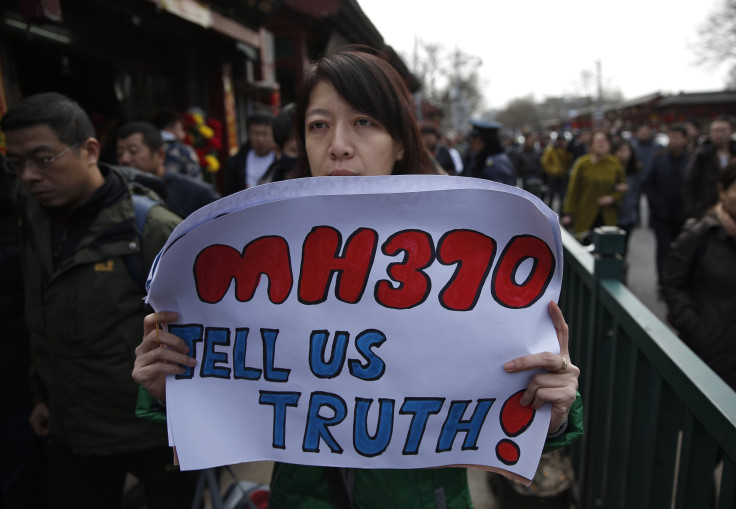MH370: Malaysian ATC Supervisor Was Asleep On Duty Four Hours After Plane Disappeared

An interim report released on the one-year anniversary of the disappearance of Malaysia Airlines Flight MH370 revealed that a Malaysian air traffic control supervisor was asleep on duty four hours after the plane went missing. The 584-page report, released on Sunday, on the anniversary of the plane's disappearance, also points to confusion between Kuala Lumpur air traffic control and their counterparts in Vietnam.
A Malaysia Airlines staff member repeatedly pressed a controller in Kuala Lumpur airport to provide details, especially about whether the country's air traffic control had successfully handed over responsibility for the Boeing 777-200 to Vietnamese air traffic control, a transcript in the report revealed. However, the controller said that he took over tower operations after 3 a.m. Malaysian time and was unaware of any other details, later adding that he would have to wake up his supervisor for more information. The transcript of conversations between civilian, military and airline personnel in the hours after the plane’s disappearance show a botched response from authorities, and the Malaysian government has agreed to probe into the points highlighted in the report by the team of international investigators.
"We will definitely take heed of the facts contained in the document and the appropriate measures will be undertaken once the necessary reviews have been completed," Malaysia's Transport Minister Liow Tiong Lai reportedly said.
The conversation had begun at 5.20 a.m. Malaysian time, nearly four hours after the plane lost communication with air traffic controllers. The report also revealed that the Ho Chi Minh air traffic controllers took nearly 20 minutes to start asking why the plane, which was traveling from Kuala Lumpur to Beijing, had not entered its airspace, something that should have been done within two minutes, according to protocol.
Malaysia's emergency services issued a distress phase only five hours after the plane’s last communication, and the first search plane took off after 10 hours, the report stated. Investigators also found that the battery that powered the aircraft's underwater locator beacon had expired over a year before the flight's disappearance.
“The Engineering Maintenance System (EMS), a computer system used to track and call out maintenance, was not updated correctly when the Flight Data Recorder was replaced on Feb 29, 2008,” investigators said, in the report. “Since the EMS was not updated, it did not trigger the removal of the flight data recorder for replacement of the underwater locator beacon battery when it was due,” said investigators, who added that the battery of the "cockpit voice recorder’s underwater locator beacon was replaced."
The search for Flight MH370 has gone on for a year now without yielding concrete clues about the plane's whereabouts. In early April 2014, Chinese and Australian search vessels had detected some pings over the search area in the southern Indian Ocean, but the signals later faded away, and authorities concluded that they were not from the missing plane's flight data recorders.
"The disappearance of MH370 is without precedent, and so too is the search -- by far the most complex and technically challenging in aviation history," Malaysian Prime Minister Najib Razak, said in a statement Sunday. "Together with our international partners, we have followed the little evidence that exists. Malaysia remains committed to the search, and hopeful that MH370 will be found."
© Copyright IBTimes 2024. All rights reserved.





















